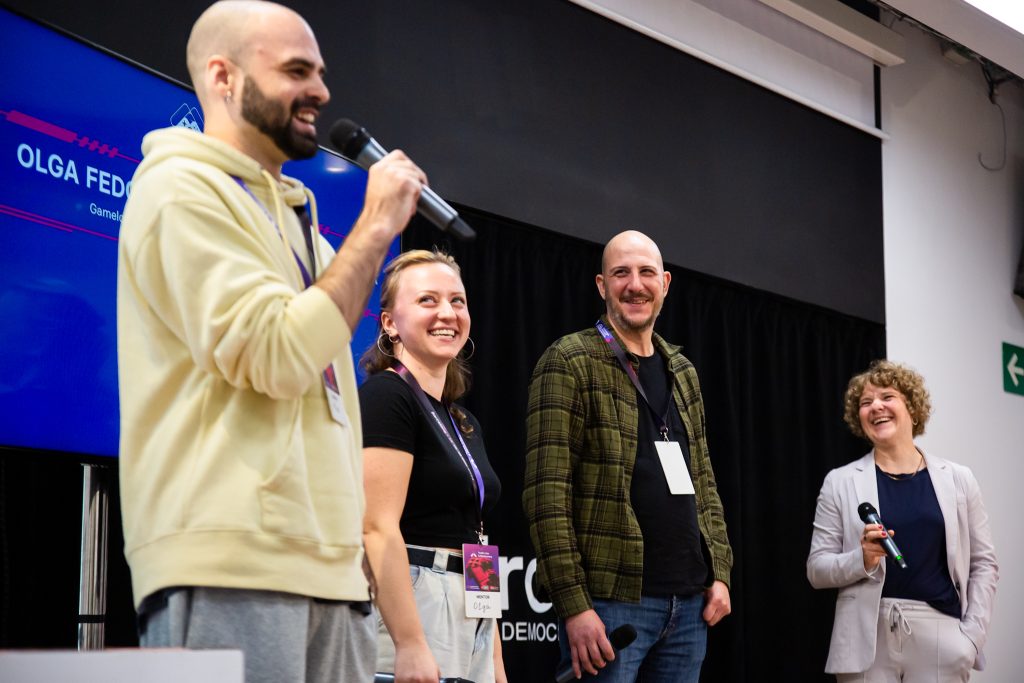The sound of fingers typing on a keyboard. A text gradually appears on my screen, announcing that a storm is coming. At the end of the sentence, the typist stops, asking me to choose what word should come next: ‘An exceptionally heavy storm is expected to hit our region this weekend, the _____ warns.’
Should I write “National Service for Public Safety”, “authorities”, or “government?” How will my choice affect the way that readers understand the text?
When we talk about disinformation, we often think of made-up statistics or other outright lies. But the video game “Truth is…” demonstrates how the precise language we use can radically alter the message of a text. The choice above may seem very small. Yet as the game unfolds, it becomes clear that a few words can make the difference between an informative piece of journalism and a conspiracy theorist rant – all starting from the same basic set of facts.
The game was developed during the inaugural “Truth, Lies & Democracy” event in Barcelona, a game jam dedicated to the topic of fake news. Part of Barcelona’s European Capital of Democracy programme year, it put game developers at the heart of the fight against disinformation.
Video games against fake news
The 2024 bumper election year has seen a wave of concern about fake news. A 2023 study by the Bertelsmann Stiftung found that 54% of EU citizens are often unsure about the reliability of information they see online. Moreover, 85% of respondents wanted to see policy-makers take more action against fake news.
The EU, national governments and civil society have been developing new ways to tackle disinformation, including fact-checking and digital literacy initiatives. Yet it can be difficult for measures like these to reach large audiences.
Around half of Europeans between the ages of 6 and 64 regularly play video games. That’s a total of 386 million gamers. Yet in spite of these impressive numbers, many have been slow to recognise the cultural significance of games. We are used to the idea that films, books or TV shows can tackle big social themes. The potential of video games, with their interactive dimension, remains largely untapped.
Ned Howey, CEO and founding member of Tectonica, was one of the mentors who assisted the teams throughout the game jam. He used his opening address to tell the game developers that politics needs their help in tackling disinformation: “We don’t know how to solve this,” he told them. “And this is why we need you. We need new communities and new views. We need new innovation, we need new points of view. And we need to go through networks that we’re not tapped into.”
The game jam
On the evening of Friday 16 May, six teams of developers, three from Spain and three from around Europe, gathered in Barcelona’s Canòdrom. They had 48 hours to each develop a game addressing the topic of fake news from scratch. A quiet corner of the venue was fitted out with bunk beds, so the teams could get some sleep without losing too much time – though most kept working late into the night.
Games jam brings together game developers – programmers, graphic designers, and others – to create a video game. The teams typically have between 24 hours and three days to develop a finished game. With very limited time available, the focus is on producing simple, catchy ideas.
Throughout the event, a group of mentors with backgrounds in game development, media literacy and political innovation provided assistance to the teams.
The games
On Sunday evening, the game jam drew to a close, and the participants presented their games in the closing ceremony. ‘Truth is…’ was just one of six games developed. The team designed it to demonstrate how subtle differences in wording can radically alter the meaning of a text.
“Truth is… plays with an uncomfortable truth, which is that the truth often can be quite boring,” explained Saskia Joanna Rauhut, one of the developers, during her presentation. “Doing the right thing and going with honesty, being objective and precise, isn’t always exciting or rewarding. We want to put the player into the shoes of someone trying to navigate that, and see what happens.’
In another game, Truth Tube, players take over a YouTube channel. They have a choice on which news stories they wish to publish. Sensationalist fake news can win them a lot of views – but it also rapidly undermines the credibility of their channel.
These and the other four games developed by the teams are all available for free download (Windows / Linux), and are ready to play.
Truth, lies and democracy 2025 in Vienna
Truth Lies and Democracy is part of Barcelona’s European Capital of Democracy programme year. Other events included the 2024 Innovation in Politics Awards, and Decidim Fest 2023.
The second edition of “Truth, Lies & Democracy” is scheduled to take place in Vienna, which assumes the title of European Capital of Democracy in October 2024.
